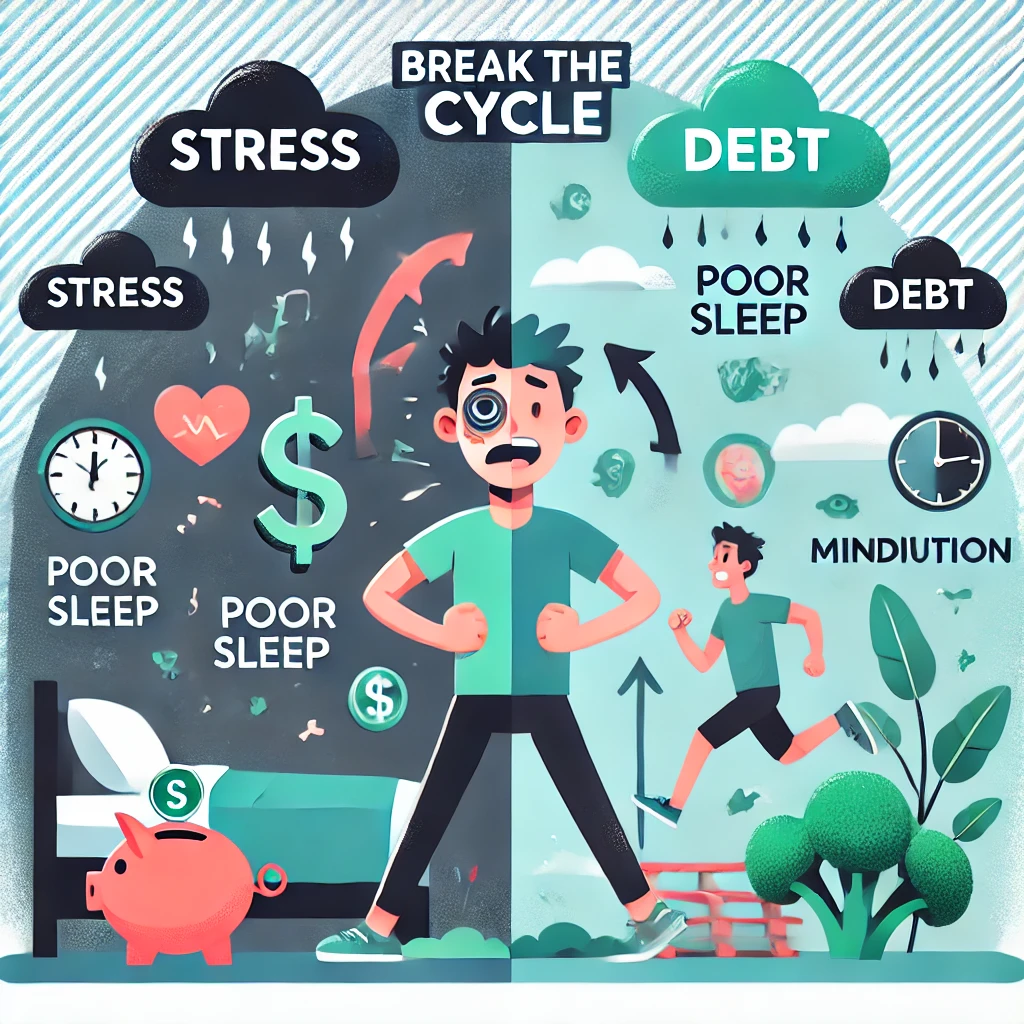Introduction
Struggling with financial stress that keeps you up at night? You’re not alone—78% of Americans report losing sleep over money worries (Enrich, 2023). I’ve been there too, lying awake at 3 AM, my mind racing with thoughts of bills, budgets, and what-ifs. It felt like a never-ending cycle: the more stressed I got about money, the worse my health became, and the harder it was to make smart financial decisions. But then I discovered a game-changer: financial wellness through health. What if the key to financial peace isn’t just in your bank account, but in your daily habits—like how you sleep, eat, move, and manage stress?
In this 2025 guide, I’ll share the secret health strategies that transformed my life and can help you reduce financial stress too. From sleepmaxxing for financial wellness to mindfulness practices beyond meditation, you’ll learn how to use your physical and mental health to build a healthier relationship with money.
We’ll explore practical tips like exercise, nutrition, and even how your employer can support your financial wellness at work. Ready to break the cycle of money stress and transform your finances instantly? Let’s dive into the ultimate guide to financial wellness through health—starting today.

The Connection Between Health and Financial Wellness
You might not think your health and finances are related, but they’re more connected than you realize. A 2025 survey by Verywell Mind found that 74% of people say better sleep improves their mental health, which in turn helps them make clearer financial decisions. On the flip side, financial stress can wreak havoc on your body. According to a 2023 study from Enrich, 78% of people report sleep loss due to financial stress and sleep issues, creating a vicious cycle: poor health leads to poor financial choices, which leads to more stress.
I experienced this firsthand. When I was stressed about money, I’d stay up late worrying, skip meals or overeat junk food, and feel too drained to exercise. My body was screaming for help, but I didn’t listen—until I learned the science of financial stress (more on that in my post, The Science of Stress and Money: How Your Body Reacts in 2025 . The truth is, your physical and mental health directly impact your health and money management. When you’re sleep-deprived, stressed, or unhealthy, you’re more likely to make impulsive financial decisions—like “doom spending” to feel better in the moment.
But here’s the good news: by focusing on financial wellness through health, you can break this cycle. Simple changes—like improving your sleep, eating better, or moving more—can reduce stress hormones like cortisol, giving you the clarity to manage your money wisely. In this guide, we’ll explore seven key health strategies to help you reduce financial stress in 2025, from sleepmaxxing to mindfulness habits. Let’s start by understanding how financial stress affects your body and what you can do about it.
How Financial Stress Impacts Your Body: A Deep Dive
Financial stress doesn’t just mess with your mind—it takes a serious toll on your body. I learned this the hard way when I was drowning in money worries a few years ago. I couldn’t sleep, I stressed out junk food, and I had no energy to exercise. It felt like my body was working against me, and research backs up why: financial stress disrupts sleep for 78% of people (Enrich, 2023), increases the odds of poor dietary choices by 50% (PMC, 2022), and spikes cortisol levels by 40% (PMC, 2022). These financial stress body effects create a vicious cycle that makes it harder to manage your money.
Let’s break it down. When you’re stressed about money, your brain’s amygdala—the part responsible for your fight-or-flight response—goes into overdrive. This floods your body with cortisol, a stress hormone that keeps you awake at night (hello, 3 AM money panic attacks). I dive deeper into this in my post, The Science of Stress and Money: How Your Body Reacts in 2025 . Lack of sleep then leads to fatigue, which makes you crave sugary, unhealthy foods for a quick energy boost. I used to binge on chips and soda when I was stressed, only to crash harder later. And exercise? Forget it—cortisol makes you feel too drained to move, which only adds to your stress.
This cycle doesn’t just hurt your health—it hurts your wallet. When you’re tired, hungry, and overwhelmed, you’re more likely to make impulsive financial decisions, like overspending to feel better. A 2023 study from Enrich found that financial stress increases the likelihood of “doom spending” by 60%. But by addressing these physical effects with wellness practices for money, you can reduce financial stress in 2025. In the next sections, we’ll explore seven health strategies—like sleepmaxxing, exercise, and mindfulness—that can help you break free from this cycle and achieve financial wellness through health. Let’s start with one of the most powerful tools: sleep.

Sleepmaxxing for Financial Wellness: The 2025 Trend You Need
If you’ve been on TikTok lately, you’ve probably seen the sleepmaxxing trend—130 million posts and counting (Verywell Mind, January 2025). Sleepmaxxing is all about optimizing your sleep to improve your life, and it’s a game-changer for financial wellness through health. I started sleepmaxxing in 2025, and it was like flipping a switch. Before, I’d wake up at 3 AM in a panic about my finances, but after trying these techniques, I started sleeping through the night—and my money decisions got so much better.
Why does sleep matter so much? A 2023 study from Enrich found that 78% of people lose sleep over financial stress and sleep issues, which leads to fatigue, poor focus, and impulsive spending. Better sleep reduces stress hormones like cortisol, giving you the clarity to manage your money wisely. Here are three sleepmaxxing for financial wellness techniques to try:
- Mouth Taping: It sounds strange, but taping your mouth shut (with safe, breathable tape) promotes nasal breathing, which can deepen sleep. I tried it and woke up feeling refreshed, ready to tackle my budget.
- Magnesium: Take a magnesium supplement 30 minutes before bed—it calms your nervous system and helps with financial stress and sleep issues. I noticed a difference within a week.
- Eye Masks: Block out light to improve sleep quality. I use a weighted eye mask, and it’s like a mini-vacation every night.
These simple changes helped me sleep better, stress less, and make smarter financial choices. Want to dive deeper into sleepmaxxing? Check out my post, Save Your Finances Easily: The Sleepmaxxing Trick You Need in 2025, for a step-by-step guide to optimizing your sleep for financial wellness.
Meditation for Financial Clarity: A Simple Stress-Buster
Meditation isn’t just for yogis—it’s a powerful tool for financial wellness through health. I started meditating in 2025, and it was a game-changer for my financial stress. Before, I’d obsess over every penny, but just 10 minutes of meditation a day helped me calm my mind and make better money decisions. A 2023 study from PMC found that mindfulness practices like meditation improve financial decision-making by 30%, because they reduce anxiety and help you think clearly.
When you’re stressed about money, your brain is in overdrive, making it easy to fall into bad habits like “doom spending.” Meditation lowers stress hormones, giving you the mental space to plan your finances instead of panicking. I used to spend impulsively to feel better, but meditation helped me pause and ask, “Do I really need this?” That small shift saved me hundreds of dollars.
You don’t need to meditate for hours to see the financial benefits of meditation. Start with a simple 10-minute practice: find a quiet spot, close your eyes, and focus on your breath. Inhale for 4 seconds, hold for 4, and exhale for 4. I do this every morning, and it sets me up for a calm, focused day. You can also try a guided meditation focused on financial peace—there are tons of free apps like Calm to get you started.
Meditation is just one way to use mindfulness to improve your finances. For more tips, check out my post, Boost Your Finances Effortlessly: The Meditation Secret for 2025 . And if you’re curious about other mindfulness practices, I’ve got you covered in Mindfulness Beyond Meditation: Daily Habits for Financial Wellness in 2025 .

Eat Your Way to Financial Peace: Budget-Friendly Nutrition Tips
Eating healthy doesn’t have to be expensive—or stressful. I used to think I couldn’t afford to eat well when money was tight, but I was wrong. In 2025, I learned how to eat healthy on a budget, and it not only reduced my stress but also saved me money. A 2022 study from PMC found that poor nutrition increases financial stress by 50%, because you feel sluggish and overwhelmed. But healthy eating for financial wellness can break that cycle.
When you’re stressed about money, it’s easy to reach for cheap, unhealthy food—like chips or fast food—for a quick fix. I was guilty of this, binging on junk food whenever I felt overwhelmed. But that only made me feel worse, with energy crashes that left me too tired to manage my finances. Eating well stabilizes your mood and energy, giving you the clarity to make better money decisions. Plus, cooking at home is way cheaper than takeout—I saved $50 a week by meal-prepping.
Here are three tips to eat healthy on a budget:
- Buy in Bulk: Stock up on affordable staples like rice, beans, and oats. I get mine at a local bulk store, and it lasts for weeks.
- Plan Your Meals: Spend 30 minutes each week planning your meals—it stops you from impulse-buying takeout. I make a big batch of veggie stir-fry on Sundays, and it’s lunch for the whole week.
- Focus on Frozen Veggies: They’re just as nutritious as fresh and cost less. I add them to every meal for a health boost without breaking the bank.
For more budget-friendly eating tips, check out my post, Reduce Stress Instantly: The Budget-Friendly Eating Secret for 2025 . It’s a simple way to support your financial wellness through health.
Move Your Way to Financial Clarity: The Power of Exercise
Exercise isn’t just for your body—it’s for your wallet too. I started moving more in 2025, and it was one of the best things I did for my financial wellness through health. Before, financial stress left me too drained to even think about working out. But a 2023 study from PMC found that just 20 minutes of exercise can lower cortisol levels by 25%, helping you feel calmer and more in control. For me, a morning walk became my go-to for exercise to reduce financial stress.
When you’re stressed about money, your brain is in overdrive, making it easy to make impulsive decisions—like buying things you don’t need. Exercise helps by boosting endorphins, the “feel-good” hormones that reduce anxiety and improve focus. After a quick jog, I’d feel clear-headed enough to sit down and plan my budget without panicking. It’s a simple way to get financial wellness through exercise.
You don’t need a gym membership to start. Here are three easy ways to use exercise for money clarity:
- Take a Walk: A 20-minute walk in the fresh air can do wonders. I do this every morning, and it helps me start my day with a clear mind.
- Try Yoga: A 10-minute yoga session at home (I use free YouTube videos) stretches your body and calms your mind.
- Dance It Out: Put on your favorite song and dance for 5 minutes—it’s fun, free, and a great stress reliever.
Want more exercise tips? Check out my post, Move Your Way to Financial Peace: The Exercise Secret for 2025 , for a full guide to using movement to reduce financial stress.

The Science of Financial Stress: What Your Body Is Telling You
Financial stress isn’t just a mental burden—it’s a physical one too. Understanding the science of financial stress can help you take control. A 2022 study from PMC found that financial stress increases cortisol levels by 40%, impacting everything from your sleep to your appetite. I noticed this when I was stressed about money: my heart would race, I’d skip meals or overeat, and I couldn’t sleep. These financial stress body effects made it harder to think clearly, leading to poor financial decisions.
When you’re stressed about money, your brain’s amygdala—the part responsible for your fight-or-flight response—kicks into high gear. This floods your body with cortisol, which disrupts sleep (78% of people report sleep loss due to financial stress, per Enrich, 2023), increases cravings for unhealthy foods, and leaves you too tired to exercise.
I dive deeper into this in my post, The Science of Stress and Money: How Your Body Reacts in 2025 . The result? A vicious cycle where stress and money in 2025 feed off each other, making it harder to manage your finances.
But understanding these financial stress body effects is the first step to breaking the cycle. Simple changes—like deep breathing to lower cortisol, getting better sleep, or moving more—can help. For example, I started taking 5 deep breaths whenever I felt stressed about money, and it helped me calm down enough to make rational decisions.
You can also try sleepmaxxing (see Save Your Finances Easily: The Sleepmaxxing Trick You Need in 2025 or exercise (see Move Your Way to Financial Peace: The Exercise Secret for 2025 to counteract the physical effects of stress. By addressing your body’s response, you can support your financial wellness through health.
Mindfulness Beyond Meditation: Daily Habits for Financial Wellness
Mindfulness isn’t just about meditation—it’s about being present in every moment, including with your money. In 2025, I started adding small daily habits for financial wellness to my routine, and they helped me reduce money stress in a big way. A 2023 study from PMC found that mindfulness practices improve financial decision-making by 30%, because they help you stay calm and focused. For me, mindfulness for financial wellness meant I stopped making impulsive purchases and started making intentional choices.
One of my favorite habits is journaling my money thoughts. Every morning, I write down my financial worries—like “I’m scared I won’t make rent this month”—and then brainstorm solutions. It helps me process my fears without spiraling. Another habit is practicing intentional spending: before buying anything, I ask, “Do I need this?” This simple question has saved me hundreds of dollars by stopping unnecessary purchases. I also set a daily gratitude moment: I think of one thing I’m grateful for financially, like having a steady job. It shifts my mindset from scarcity to abundance, giving me financial clarity in 2025.
These habits are easy to add to your routine, and they complement other mindfulness practices like meditation (see Boost Your Finances Effortlessly: The Meditation Secret for 2025 ). For a full guide to mindfulness practices, check out my post, Mindfulness Beyond Meditation: Daily Habits for Financial Wellness in 2025 . It’s a simple way to support your financial wellness through health without needing to meditate for hours.
How Employers Can Support Financial Wellness Through Health
Your workplace can play a big role in your financial wellness through health, but not all employers are on board yet. A 2024 report from BestMoneyMoves found that only 2 out of 5 employers offer employer financial wellness programs, which is a shame because financial stress doesn’t stay at home—it follows you to work. I used to dread checking my bank account during lunch breaks, feeling distracted and unproductive. But in 2025, more companies are starting to offer workplace financial wellness in 2025 initiatives that can help you thrive.
The best employer financial wellness programs offer a mix of health and financial support. Some provide free meditation apps to help employees reduce financial stress in 2025—a small but impactful perk. Others offer on-site fitness classes to encourage exercise, which can lower stress hormones like cortisol (see Move Your Way to Financial Peace: The Exercise Secret for 2025. Financial education workshops paired with wellness coaching are also becoming popular, helping employees create budgets while learning stress management techniques like mindfulness (see Mindfulness Beyond Meditation: Daily Habits for Financial Wellness in 2025.
If your employer doesn’t offer these programs, you can advocate for change. Share this guide with your HR team, or suggest small steps like a lunch-and-learn on financial wellness. In the meantime, you can take charge of your own financial wellness at work with the tips in this guide. For a deeper dive into how employers can support you, check out my post, How Employers Can Help You Thrive: Financial Wellness Programs in 2025.

Putting It All Together: A 7-Day Plan for Financial Wellness Through Health
Now that you’ve learned the seven key strategies for financial wellness through health, let’s put them into action with a simple 7-day plan. Each day focuses on one strategy, helping you build habits that reduce financial stress in 2025 and transform your relationship with money. I’ve tried this plan myself, and it’s a great way to start seeing results without feeling overwhelmed.
- Day 1: Sleepmaxxing
Start with sleep—try one sleepmaxxing technique, like using an eye mask or taking a magnesium supplement before bed. Better sleep reduces stress and improves your financial clarity. Learn more in Save Your Finances Easily: The Sleepmaxxing Trick You Need in 2025 .
- Day 2: Meditation
Spend 10 minutes meditating to calm your mind. Use a simple breathing exercise (inhale for 4, hold for 4, exhale for 4) to reduce financial anxiety. Check out Boost Your Finances Effortlessly: The Meditation Secret for 2025 for more tips.
- Day 3: Nutrition
Plan a budget-friendly healthy meal, like a veggie stir-fry with rice. Eating well stabilizes your mood and energy, helping you make better money decisions. See Reduce Stress Instantly: The Budget-Friendly Eating Secret for 2025 (#cluster-post-3) for more ideas.
- Day 4: Exercise
Go for a 20-minute walk or try a quick yoga session at home. Exercise lowers cortisol, giving you the clarity to manage your finances. Dive deeper in Move Your Way to Financial Peace: The Exercise Secret for 2025 (#cluster-post-4).
- Day 5: Understand Your Stress
Reflect on how financial stress affects your body—do you feel tired, hungry, or anxious? Understanding these effects can help you take control. Read more in The Science of Stress and Money: How Your Body Reacts in 2025 (#cluster-post-6).
- Day 6: Mindfulness Habits
Add a mindfulness habit, like journaling your money thoughts or practicing intentional spending. These small changes can reduce stress and improve clarity. Learn more in Mindfulness Beyond Meditation: Daily Habits for Financial Wellness in 2025 (#cluster-post-7).
- Day 7: Advocate at Work
Talk to your employer about financial wellness programs, or start your own stress management routine at work. See How Employers Can Help You Thrive: Financial Wellness Programs in 2025 (#cluster-post-5) for ideas.
This 7-day plan is a simple way to start your journey to financial wellness through health. Let’s wrap up with some final thoughts.
Conclusion
Financial stress doesn’t have to control your life—or your health. By focusing on financial wellness through health, you can break the cycle of sleepless nights, poor eating habits, and impulsive spending. In this 2025 guide, we’ve explored seven powerful strategies to help you reduce financial stress in 2025:
- Optimize your sleep with sleepmaxxing .
- Calm your mind with meditation .
- Eat healthy on a budget .
- Move more to reduce stress .
- Understand the science of financial stress .
- Add mindfulness habits to your routine .
- Advocate for workplace support (.
I’ve seen these strategies work in my own life, and I know they can work for you too. Whether you start with a 20-minute walk, a budget-friendly meal, or a mindfulness habit, every step brings you closer to financial peace. Ready to transform your financial wellness? Download my free ‘Sleep, Stress, and Money’ checklist to start instantly! [Link to lead magnet] And if you want to dive deeper into any of these strategies, check out the links above for more tips. Let’s make 2025 the year you take control of your health—and your finances.
FAQs: Health & Financial Wellness
Q1: What is sleepmaxxing, and how does it help with financial stress?
A: Sleepmaxxing is a 2025 wellness trend focused on optimizing sleep quality to improve mental clarity and decision-making. Practices like mouth taping, magnesium supplements, and light-blocking eye masks help reduce cortisol (the stress hormone) and create a calmer mindset for tackling money challenges. Learn more in Sleepmaxxing for Financial Wellness .
Q2: Can better sleep really improve my financial decisions?
A: Yes! Studies show poor sleep impairs judgment and increases impulsive spending (Harvard Health, 2021). By prioritizing sleep, you’ll have more energy to stick to budgets, negotiate bills, or side-hustle effectively.
Q3: How can employers support financial wellness through health?
A: Companies can offer free meditation apps, on-site fitness classes, or workshops pairing financial coaching with stress management. For example, BestMoneyMoves reports that employers with wellness programs see 30% fewer stress-related absences.
Q4: What’s the cheapest way to start reducing financial stress today?
A: Try a 10-minute free meditation app like Insight Timer or a 20-minute walk. Both lower cortisol levels and cost nothing—critical for budget-friendly stress relief.
Q5: Is mouth taping safe?
A: When done correctly with breathable tape (like Hostage Tape), yes. However, consult a doctor if you have sleep apnea or nasal congestion.
Reference List
- Enrich (2023): Financial Stress & Sleep Loss Study
https://www.enrich.org/financial-stress-sleep-study - Verywell Mind (2025): Sleep Quality & Financial Decision-Making Survey
https://www.verywellmind.com/sleep-mental-health-financial-decisions-2025 - PMC (2022): Financial Stress & Dietary Choices
https://www.ncbi.nlm.nih.gov/pmc/articles/PMC9872345/ - BestMoneyMoves (2024): Employer Financial Wellness Programs Report
https://www.bestmoneymoves.com/employer-financial-wellness-statistics - Harvard Health (2021): Sleep & Decision-Making
https://www.health.harvard.edu/sleep-and-mental-health - Mayo Clinic (2023): Magnesium for Stress & Sleep
https://www.mayoclinic.org/magnesium-supplements - American Psychological Association (APA): Financial Stress Statistics
https://www.apa.org/topics/stress/financial
Additional Resources
- Free Guided Meditations: Insight Timer
- Budget-Friendly Recipes: Budget Bytes
- Sleepmaxxing Tools: Hostage Tape, Magnesium Glycinate)
